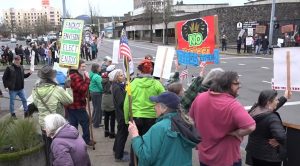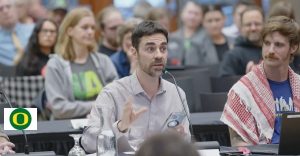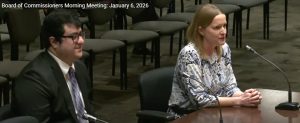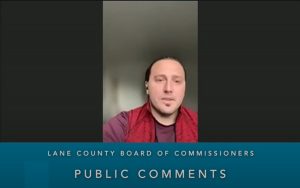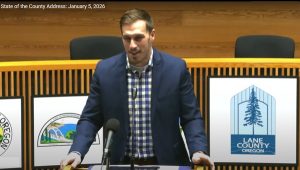SETA, DPLC, SquareOne support tenant opportunity to purchase
12 min read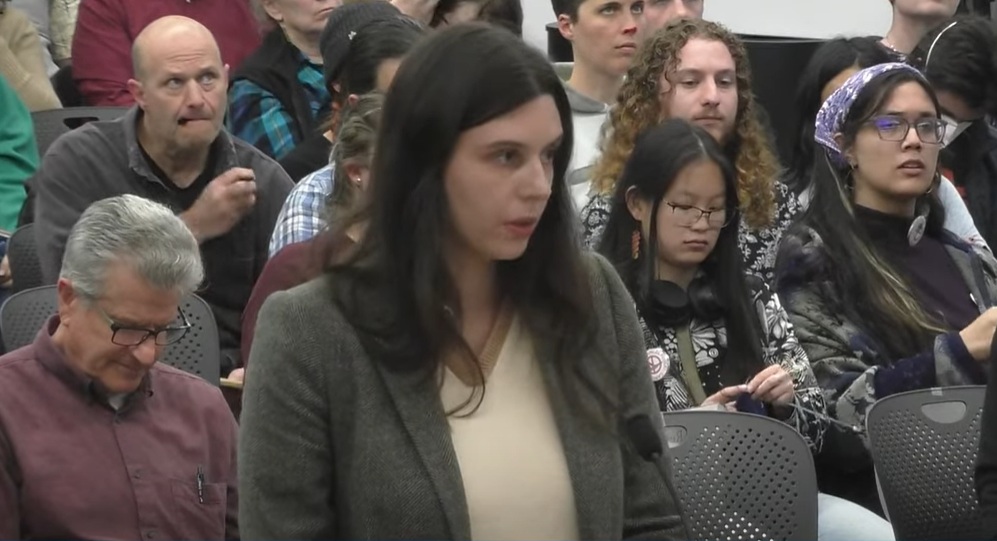
Presenter: Public comments at the City Council introduce the Tenant Opportunity to Purchase Act. Oct. 27, Timothy Morris:
Timothy Morris: My name is Timothy Morris, and I’m the executive director of the Springfield Eugene Tenant Association. I’m here today to ask you to direct staff to work with community groups and renters to bring the Tenant Opportunity of Purchase Act or TOPA framework in renter protections Phase 3.
[00:00:24] TOPA establishes a city-structured process for forming tenant associations, which ensures the residents have enough time to consider and respond to purchase offers. After forming an association in multiunit buildings, tenants can enjoy the first right of refusal to actually purchase their homes instead of just being a part of an exchange between two entities. And a prospectus has already been sent to your emails for more details.
[00:00:51] This is a commonsense, proven policy designed to keep people in their homes and preserve affordability in our communities. It gives tenants the chance to organize, to work together with nonprofits and other entities, and to make an offer to buy buildings when they go up for sale, before it’s sold to out-of-state investors, who often raise rents and displace long-term residents.
[00:01:13] There is an example that happened just a few weeks ago, where one of the new riverfront developments is now sold to Greystar, which is one of the largest property management companies in the United States, known for ratcheting up rents and evicting tenants. TOPA has a proven record of over 40 years in Washington, D.C. and similar policies passed in Berkeley and San Francisco.
[00:01:37] We have success stories even here in Lane County with residents at Vida Lea, Dexter Oaks, Shoreview Meadows, and the Filbert Grove collectives who have all utilized manufactured home-staked opportunities to purchase frameworks to buy and operate their parks, and the residents themselves get to set the rent prices, repairs, get to have those conversations about being a community together.
[00:02:02] TOPA provides a clear and direct path to homeownership, something that is severely lacking in our city, in our state, and in our country. We urge you to move forward with a TOPA policy here in Eugene. Thank you.
[00:02:15] Celine Swenson Harris: My name is Celine Swenson Harris. I am here this evening in my capacity as chair of the Democratic Party of Lane County. And here to voice our support for a tenant opportunity to purchase.
[00:02:27] One of the primary concerns that we hear from our members and from community members at large in talking about local politics and policy is housing affordability. And I’m sure that that is something that doesn’t come as a surprise to any of you because I know that you talk to your constituents and I know that you’re doing the same things.
Our platform calls on our local elected officials to look for innovative new solutions to our housing crisis. We also passed a resolution—and our platform specifically identifies TOPA as one of these potential solutions—to make affordable housing a reality here in our community, to make it possible for people who love this place to stay here and be stable here.
In a time when we know that public dollars are stretched thin, we also know that this is a policy solution that is low- or no cost to the city. It doesn’t call on you to invest additional dollars. It provides people with an opportunity to own their home. It’s also a proven solution for other housing types here in Oregon and for these housing types in other states.
And with that, I urge you to look into this as a way that we can make Eugene a place that more people are able to stay.
[00:03:41] Hava Kronen: My name is Hava Kronen, and I would like to start with some appreciations…to thank the city of Eugene for passing renters protections, such as capping rental application fees at $10. I work with low-income families with small children, and application screening fees can be as high as $30 to $50 or more per adult. When you are low-income, that is just too much.
[00:04:03] Relocation assistance has been essential for families to move when their leases are not renewed due to no fault of their own. I am appreciative of the work of Amy Cameron, the city’s rental analyst, and the Springfield Eugene Tenant Association. I would not be able to support families without these resources.
[00:04:20] I previously spoke about the need to evaluate the impact of non-owner-occupied short-term rentals on homelessness. I hope the city will do this. I work with a family, two adults for children who were housed during the pandemic because the owner couldn’t use his extra home as an Airbnb and this family’s lease was not renewed.
[00:04:39] And because of the housing crisis, they were homeless for more than three years. These children had special needs. And when you are experiencing homelessness, that means appointments with specialists are disrupted, as is schooling. The long-term impact of this trauma on the family and for our community should be felt by everyone.
[00:04:57] I would like the city to adopt TOPA as part of the third phase of renter protections, as another tool in the toolbox to address housing crisis. It’s one of those upstream solutions. I started watching the YouTube on the Housing Oregon channel to learn more about it.
I do know what happens when an apartment or mobile home park is sold and the tenants have literally nowhere to go because of the high cost of housing. That’s what I face in my work. I give thanks every day that I have a home and will not be evicted. I’m not special. I’m just lucky. And I think all of us who are lucky in that way have to focus on making sure no one has to face losing their housing because their home has now become a commodity.
[00:05:42] Molly Goulet: My name is Molly Goulet. I’ve been a Eugene renter in the past and I work locally as a tenant attorney. I’m here today to ask you to support adding a tenant option to purchase to Phase 3 of the renter protections process.
‘Tenant Option to Purchase’ or TOPA is a proven strategy that increases local homeownership and preserves affordable housing.
[00:06:05] Washington, D.C. has used TOPA for over 40 years as its primary strategy to preserve affordable housing. In the framework that we’ve proposed, Eugene’s TOPA would give tenants the right of first to purchase a rental complex of four or more units when the owner chooses to put it on the market or receives an offer.
[00:06:27] There is minimal contract impairment in this strategy, as the owner would be able to request the appraised value for the property in the sale. The tenants have an organizing period, which requires 50% participation to proceed, and then if they are able to gather the numbers, there’s a second period so that they can secure financing.
[00:06:50] Community housing nonprofits have offered to step forward and help organize tenants, but we would love to see the city support in the notification process and the potential allocation of housing trust funds for deposit assistance. The average unit would cost less than $200,000 with no subsidy, and tenants who have a housing voucher would be able to convert that to pay their mortgage. Eugene needs stable, affordable housing with local ownership, and TOPA is an excellent tool to keep our renting neighbors in their homes.
[00:07:28] Right now, many renters don’t realize that they could form an HOA, join a land trust, or form a limited-equity co-op to control their housing.
[00:07:37] Community forms by repeated small contacts. We can strengthen Eugene’s communities by keeping neighbors in their homes using TOPA.
[00:07:48] Jeff Albanese: My name is Jeff Albanese.
I’m a renter in Eugene and have been since 2018 and in 2020 during the pandemic, I was no-cause evicted by my landlord, and I was very impressed in the years after that, with the work that the City Council did to support Eugene renters by passing the Phase 2 renter protections, one of which addressed the issue that I got to experience in 2020.
Tonight, I’m here to ask for the Council to further strengthen the support you’ve shown for Eugene renters and direct city staff to bring forward an opportunity to purchase ordinance for the council’s consideration.
[00:08:28] Opportunity to purchase rights can help renters stay in their homes, when their landlord wants to sell their building. It does what it sounds like. Similar legislation has helped renters in Washington, D.C. to preserve the affordability of their homes for over 40 years. Closer to home, manufactured home park residents throughout Oregon currently have opportunity to purchase rights by state statute.
[00:08:53] These laws have helped preserve thousands of affordable homes throughout the state, and Eugene could do something very cool by extending similar protections to multifamily renters.
I also work for SquareOne Villages, an affordable housing developer in Eugene. We focus specifically on cooperative housing development and SquareOne is also officially supporting opportunity to purchase ordinance in Eugene.
[00:09:19] We’ve supported state legislation the past couple long sessions in the legislature too, just by the way. So please, I hope you’ll build on the important work that this Council has done in the past few years and direct city staff to bring an ‘opportunity to purchase’ ordinance as a future agenda item for the Council’s consideration.
[00:09:41] Sophie Bybee: My name is Sophie Bybee, and I’m a renter in Ward 1. As a staff member at CASA of Oregon, I’ve been working with the coalition that’s here tonight to ask for the incorporation of TOPA into the renter protections Phase 3 process.
[00:09:52] We know the TOPA model works to preserve long-term housing affordability and keep communities together. That’s why the state has already has a similar opportunity to purchase framework for manufactured home parks and marinas. Since 2009, my team at CASA has worked with residents of manufactured home communities who want to form cooperatives and purchase their parks from private landlords. We also provide technical assistance to these cooperatives post-purchase.
[00:10:15] Nationally, the annual fee increase in commercially-owned manufactured home communities is over 7%. In cooperatives, the annual fee increase is less than 1% per year. In Oregon, CASA works with 28 manufactured home cooperatives, including one in Eugene Springfield and four more in Lane County. Many cooperatives haven’t seen a fee increase since they purchased their park.
Resident ownership not only preserves affordability, but also preserves and strengthen sense of community and connection to place.
[00:10:40] I asked a Lane County cooperative resident what the biggest difference in her life was before and after the community bought the park. She looked at me like she was surprised I had to ask. ‘The fear,’ she said. She remembers waking up every day after learning the park might sell, afraid that she would lose her home. Her 90-year-old mother lives independently in another home in the community. It didn’t seem possible they’d find somewhere else they could afford to be neighbors.
[00:11:00] But instead of losing their strong social and support networks, this resident became a director on her cooperatives board after the community organized to purchase the park. Her and her mom are still neighbors, living half a mile away from her mom’s doctor and their favorite local walking spot. If we want an engaged and invested community, we need to give people the opportunity to stay in the community.
[00:11:19] It’s not only tenants that have this goal. Just this morning, I responded to an email from a private landlord in Bend who is interested in selling his park to the residents. He knows how crazy housing costs are and doesn’t want to see people displaced.
Frameworks like TOPA accomplish what they set out to do: Preserve affordability and stabilized communities. They’ve won broad coalition support across this housing sector. Please consider building on the success of these frameworks and including TOPA in Phase 3. Thank you.
[00:11:43] Chaz Kern: Hello. My name is Chaz Kern. I’m a renter in Ward 2. I currently work as a project manager in housing development at SquareOne Villages, a local nonprofit that builds permanently affordable cooperative housing in Eugene and Lane County. I’m here tonight to ask you to direct staff to include a tenant’s opportunity to purchase act or TOPA in Phase 3 of the renter protections process.
[00:12:03] TOPA gives renters the first chance to decide who will purchase the property they live in when it puts up for sale. It sets a clear, time-bound process that gives renters choices and a fair say in what happens in their homes. Of these choices, they can partner with a nonprofit developer to keep rents affordable and secure long-term rent protections, or buy their buildings together as a condo or co-op. At SquareOne Villages, we’ve seen how residents can become homeowners through co-ops, creating housing that stays permanently affordable and are governed by the people who live there.
[00:12:35] TOPA would make this kind of collective ownership easier to achieve for existing renters across Eugene. In Washington, D.C., TOPA has worked for more than 40 years, supported by a network of tenant organizers, attorneys, advocates, and mission-driven developers. And between 2006 and 2020, it helped preserve and create over 16,000 affordable homes in D.C., showing that when renters have a fair process, they can strengthen their communities for the long term.
[00:12:58] In learning from D.C.’s history, we know that TOPA takes partnerships to succeed. And here in Eugene, we have tenant organizers, organizers, attorneys, mission-driven developers, advocates ready to work alongside city to build this TOPA framework. Please consider including TOPA framework in Phase 3 of the renter protection process. Thank you.
[00:13:14] Kevin Cronin: Hello, my name is Kevin Cronin. I live in Ward 7 in the River Road neighborhood. I’ve been an advocate for affordable housing development and tenant protections for over 10 years.
I’m here tonight to ask you to direct city staff to work with our community groups like SquareOne, CASA, and the Springfield Eugene Tenant Association to bring forward tenant opportunity to purchase.
Twenty years ago this month, I survived the destruction that Hurricane Wilma brought upon my town, and I moved out here to the Northwest. Then in 2011, after being no-cause evicted, I was homeless, living on my friend’s porch and struggling to survive. I spent years scraping to save, and today I’m a homeowner. I’m a homeowner because I had an opportunity to purchase from one of our town’s largest landlords.
Since June of 2024, Eugene has had at least 17 multifamily buildings of 360 total units listed for sale with an average price of $179,000 per unit. The median listing is buildings that have 10 units. With current interest rates, these properties have been loitering on the market, some even relisting after a few months, or being repackaged with another listing.
[00:14:31] Eugene already has a condo conversion law on the books, but we’ve had a few projects take advantage since it’s kind of from a different era. Eugene should update and improve upon that by passing a tenant opportunity to purchase.
Our mayor was swept in on a mandate for middle housing. TOPA is a way for the city to empower tenants to partner with our trusted community-based organizations to convert their existing apartments into affordable middle housing homeownership options or to stay as permanent affordable rental housing.
This model of preservation opens up one of the most bang-for-your-buck investment opportunities with our limited affordable housing resources. It also builds on the LIRHPTE (low-income rental housing property tax exemption) ordinance that you passed earlier tonight so that these properties would be eligible for LIRHPTE. Please make a motion to direct city staff to bring a TOPA framework as part of an existing future agenda item that you already have, renter protections, Phase 3. Also, I don’t really like the Flock cameras. And if you give us the go-ahead, I’ll get some guys from my neighborhood. We can go take it down for you. Thanks so much.
[00:15:45] Andrew Becker: Hi there, Andrew Becker. Madam Mayor, tonight you opened things up with a land acknowledgement and I think, you know, it’s important to realize why we would do something like that is because people were displaced from the homes that they lived in.
[00:15:58] You know, there were people that lived here and they were forced out, and in the same way people that live at the Eugene Hotel were forced out, when DiNapoli (Capital) Partners, some East Coast private equity firm, came in and jacked up their rent to the maximum allowable amount every year.
[00:16:17] So I think it’s really important that we try to curtail the commodification of housing and find solutions to make sure that people aren’t displaced from their homes again and again and again and again and again. When we can do something like TOPA that’s a small fix around the edges, it wouldn’t really cost the city anything, I think that’s just a smart choice.
[00:16:41] Presenter: Eugene’s City Council is asked to take a look at TOPA, the Tenant Opportunity to Purchase Act, when they look at renter protections in 2026.
